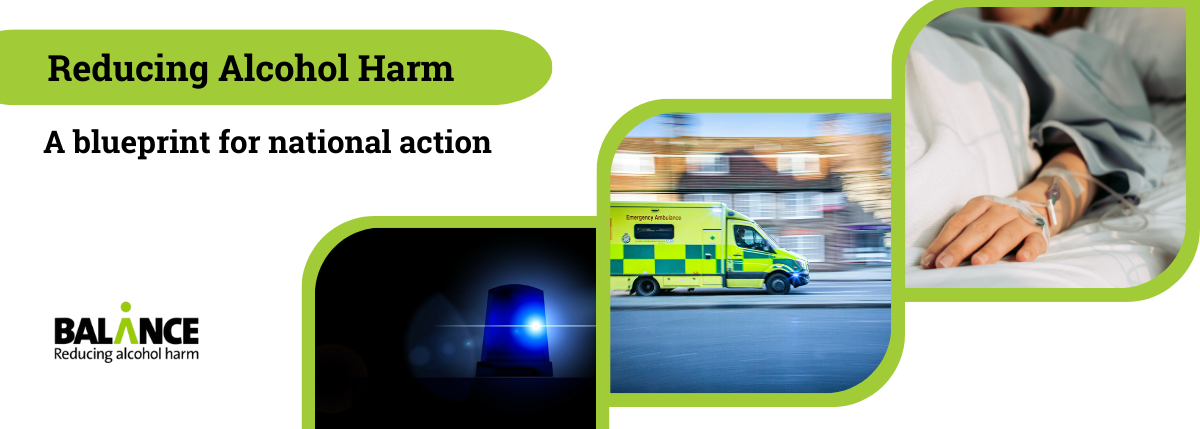Balance unveils Blueprint to Reduce Alcohol Harm
Today, Balance launches “Reducing Alcohol Harm”, a ground-breaking blueprint calling for urgent national action to tackle the significant impact of alcohol on health, social care, crime, disorder, workplaces, and the economy. It comes as new research finds 82% of North East adults consider alcohol to be a problem both regionally and nationally.
This new document from the North East alcohol program underlines the critical need for stronger measures to curb alcohol-related harm across the region and the UK, and reveals the latest statistics to demonstrate how the public sees alcohol impacting on daily life.
The blueprint is supported by the Alcohol Health Alliance, the Institute of Alcohol Studies and prominent leaders from across the North East—including Directors of Public Health, Police and Crime Commissioners, the NHS Integrated Care Board for the North East and North Cumbria, and the Mayor of the North East Combined Authority – as well as by individuals who have directly experienced the harm alcohol can cause. It outlines key actions to alleviate the strain that alcohol places on the NHS and wider emergency services.
Stark Statistics Highlight the Need for Action:
- Alcohol contributes to nearly 980,000 hospital admissions and secondary diagnoses in England each year, including conditions such as cardiovascular disease, mental and behavioural disorders, cancers, and liver disease (1).
- Alcohol is a factor in around 525,000 alcohol-related violent incidents a year in England and Wales (2).
- The financial cost of alcohol is immense, with the North East alone incurring costs of around £1.5 billion annually in health, crime and disorder, social care, and economic costs (3), and nearly £27.4 billion across England (4).
Blueprint Aims for Healthier, Stronger and Safer Communities:
“Reducing Alcohol Harm” seeks to foster safer, stronger, and healthier communities, empowering people to live free from excessive exposure to alcohol promotion and pressures to drink from the alcohol industry. It calls for a co-ordinated and evidence-based national approach from national Government to reduce the damage alcohol inflicts on society and to support individuals in making healthier choices.
The blueprint presents compelling evidence of the scale of alcohol-related harm and its impact on community wellbeing, while proposing steps for policymakers, health professionals, and community leaders.
New research highlights the urgency of this call to action:
- 82% of people in the North East believe alcohol is a significant problem both nationally and regionally. (5)
- 83% of people in the North East support measures to limit children’s exposure to alcohol promotion and marketing. (6)
- Nearly 45% feel that the government has not done enough to tackle alcohol harm on a national level. (7)
- 48% support the introduction of a Minimum Unit Price in England (7)
- 67% feel the government has a responsibility to try to protect people from alcohol harms by raising awareness of risks and encouraging people to drink within low-risk guidelines. (8)
- 59% say government has a responsibility to try to protect people from alcohol harms by introducing regulations and licensing laws. (9)
- 22% of people have been negatively impacted by alcohol consumption in some way in the last year alone. (10)
Despite record levels of alcohol-specific deaths and hospital admissions, regional figures do show some positive signs of change. 62% of people in the North East now are actively taking steps to cut down on their drinking (11), while 15% now abstain from alcohol entirely — the highest rate of non-drinkers recorded in the region (12). But constant alcohol promotions and pricing deals designed to lure people into bulk-buying are designed to encourage people to drink regularly and can undermine healthy intentions.
Ailsa Rutter, Director of Fresh and Balance said: “The impact of alcohol is being felt on our health, criminal justice system, on our economy and across society with harms at record levels – this is an avoidable crisis but it has been ignored for too long. This is a unified call to action from leaders and real people based in the North East for positive and evidence-based action to reduce alcohol harm.

“Four out of five people in the North East (82%) see alcohol as a big problem regionally and nationally, and yet awareness of its health risks is still worryingly low.. It is clear that reducing alcohol harms must be at the forefront of the Government’s efforts to build a healthier, safer and more economically productive country.
“And for the sake of local families, we need more action to prevent vulnerable people from becoming ill and dying from alcohol and to reduce the burden on our NHS and emergency services.”
Karen Slater, 56, is a Newcastle mum of four. She experienced alcohol harm first-hand when she grew up around alcohol in a hostile and dangerous environment. She was a victim of child abuse and domestic violence and sought solace in alcohol, drugs and self-harm.
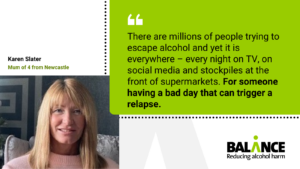
Karen said: “Alcohol advertising and the pressure to drink is insidious. There are millions of people trying to battle or escape alcohol and yet it is everywhere – every night on TV, on billboards, on sport, social media and stockpiles at the front of supermarkets. For someone having a bad day or a bad moment, that can trigger a relapse.
“My reality and many others is the exact opposite of the allure of alcohol promotion. It’s about drink-fuelled isolation, domestic violence, child neglect and A&E being overrun by people under the influence of alcohol.”
Amanda Healy, Director of Public Health for Durham County Council and Chair of North East ADPH Network, said: “I am supporting the blueprint put forward by Balance. We have a really strong approach to alcohol harm reduction here in the North East, however we are a region with huge health inequalities, which increases the burden of alcohol harm across our communities.
“We are the region which would benefit the most from national action and we urgently need an evidence-based alcohol strategy that protects vulnerable people, provides ongoing support for treatment, and includes action to reduce the price, promotion and availability of alcohol.”
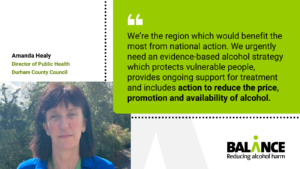
Alice Wiseman, Vice President of the Association of Directors of Public Health and Director of Public Health for Gateshead and Newcastle, said: “For too long the harms of alcohol have been soaring – but a lack of national regulation and a free pass for the alcohol industry to keep people drinking at risky levels has failed communities and hit our public finances.
“Many alcohol harms are preventable. We simply can’t afford for alcohol to be taking such a toll on individuals, families and communities and it is staggering to see the impact on frontline services across the North East. We now need to balance the profits of the alcohol industry with protecting local communities.
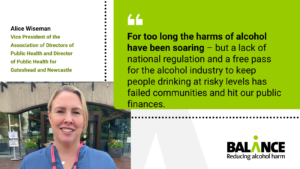
“Action within the region can only take us so far – we need a national conversation and evidence-based action to grapple with this alcohol crisis. The health and wealth of our region depend on it and we implore national Government to take this problem seriously.”
Joy Allen, Police and Crime Commissioner for County Durham & Darlington, said: “I offer my full support to Balance and its blueprint for national action to reduce alcohol harms.
“Alcohol-related harm is deeply rooted with inequality, and it is no coincidence that the North East suffers some of the highest rates in the country. With around 1 million people across the UK drinking at levels that seriously endanger their health, this is a crisis that can no longer be ignored. Families in our region are crying out for help, and I have personally witnessed the life-shattering impact alcohol-related crime has on victims, as well as the unbearable strain it places on public services already stretched to breaking point.
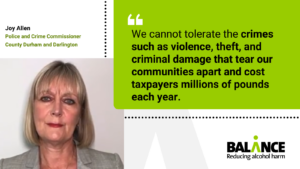
“In my force area, more than 33% of serious violent offences are alcohol-related. This is unacceptable. We cannot allow people to continue dying from preventable alcohol-related diseases, nor can we tolerate the crimes such as violence, theft, and criminal damage that tear our communities apart and cost taxpayers millions of pounds each year.
“We owe it to the people of this region to take decisive action now. It’s not just about reducing harm; it’s about ensuring that everyone has the opportunity to live healthier, safer, and more prosperous lives.”
Dr Neil O’Brien, Chief medical officer for the North East and North Cumbria NHS Integrated Care Board, said: “Alcohol harm is often rooted in the inequalities faced by communities such as those in the North East. Alcohol causes and contributes to serious illnesses and episodes requiring medical care, resulting in nearly 1 million hospital admissions and secondary diagnoses in the NHS every year.
“Alcohol can harm the body in a lot of different ways, from severe diseases of the liver and pancreas, increased risk of at least seven types of cancer, heart disease and stroke. People also sometimes turn to alcohol when they experience mental health problems, but in many cases the effect of alcohol can make mental health worse.

“Prevention across all aspects of the system nationally and regionally is key to preventing ill health in the first place and also to reducing pressures on the NHS in the longer term.”
Professor Sir Ian Gilmore, Chair of the Alcohol Health Alliance said: “Alcohol harm nationally is rising and costs society over £27 billion a year in terms of its impact on health, social care, crime and disorder and workplaces. The Balance Blueprint amplifies the call for national preventative action that is echoed by many public health experts, as well as those affected by alcohol every day on the front line.
“The North East region suffers the worst alcohol harms and therefore plays a crucial role in identifying barriers to better health and productivity caused by alcohol. The Blueprint is a powerful statement from partners across the region, and it comes at a time when the need for national action is more urgent than ever: for the future of the NHS, healthier communities, and for economic growth.”
Recommendations to the Government:
1: Commit to the introduction of an evidence-based national alcohol strategy for England, free from alcohol industry influence.
2: Take steps to raise awareness of alcohol harms, via the delivery of public education campaigns such as Balance’s ‘Alcohol is Toxic’ campaign, the introduction of mandatory health warnings and nutritional / unit / calories information on alcohol labels.
3: Introduce pricing policies which improve public health and protect the public purse, including a minimum unit price (MUP) for alcohol in England and a fairer alcohol duty system which keeps pace with inflation.
4: Introduce restrictions on alcohol marketing to protect children and vulnerable people.
5: Introduce a ‘public health objective’ in England and Wales and consideration of a wider overhaul of the Licensing Act.
6: Invest in prevention and early intervention and improving access to specialist support for at-risk drinkers.
7: Ensure that the alcohol industry is prohibited from involvement in the development of public policy around alcohol.
References
1: NHS Statistics on Alcohol, England 2021, Official statistics, National statistics: https://digital.nhs.uk/data-and-information/publications/statistical/statistics-on-alcohol/2021/part-1
2: IAS, Patterns in Alcohol Related Violence https://www.ias.org.uk/wp-content/uploads/2023/02/Patterns-in-alcohol-related-violence-IAS-February-2023.pdf
4: https://www.ias.org.uk/factsheet/economy/
5-12: Balance – a Blueprint for Reducing Alcohol Harm 2024. Figures taken from North East Alcohol Perceptions Research, Independent Survey by Bluegrass Research of 983 adults across the North East, 2024.
